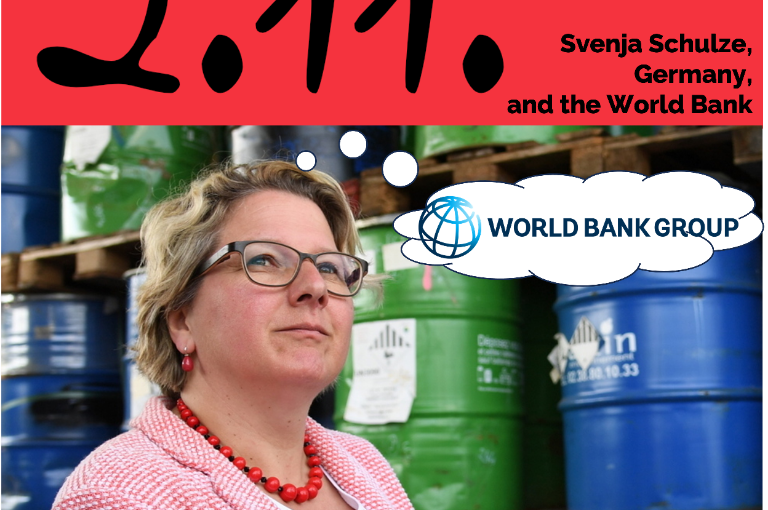Svenja Schulze currently serves as Germany’s Federal Minister for Economic Cooperation and Development, as well as the country’s representative at the World Bank, where Germany holds the 4th largest voting power. Voting shares are allocated based on economic power, thus prioritizing the agendas of richer countries. The US, Japan, China, Germany, and the UK hold the largest voting shares. With such neocolonial power dynamics, the World Bank typically lends money to Low- and Middle-Income Countries (LMICs) with strings attached, assuring that economic aid arrives with measures of austerity, foreign control, and extractivist priorities. For example, the World Bank, along with other loan providers, encouraged Senegal to promote carbon-intensive industries, favouring oil and gas as part of Senegal’s recovery from the economic impacts of Covid-19.
(DE)
Svenja Schulze ist derzeit Bundesministerin für wirtschaftliche Zusammenarbeit und Entwicklung sowie Vertreterin Deutschlands bei der Weltbank, in der Deutschland das viertgrößte Stimmrecht hat. Die Stimmanteile werden nach der Wirtschaftskraft verteilt, so dass die Vorstellungen der reicheren Länder Vorrang haben. Die USA, Japan, China, Deutschland und das Vereinigte Königreich halten die größten Stimmanteile. Angesichts dieser neokolonialen Machtdynamik vergibt die Weltbank Kredite an Länder mit niedrigem und mittlerem Einkommen (LMICs, “Low- and Middle-Income Countries”) in der Regel mit Auflagen, die die Wirtschaftshilfe an Sparmaßnahmen, auswärtige Kontrolle und extraktivistische Prioritäten bindet. So hat die Weltbank zusammen mit anderen Kreditgebern den Senegal ermutigt, kohlenstoffintensive Industrien zu fördern und Öl und Gas als Teil der Erholungsmaßnahmen nach den wirtschaftlichen Auswirkungen von Covid-19 zu begünstigen.
(ES)
Svenja Schulze es Ministra Federal de Cooperación Económica y Desarrollo de Alemania, así como la representante aleman en el Banco Mundial, donde Alemania ocupa el cuarto lugar en poder de voto. Las cuotas de voto se asignan en función del poder económico, priorizando así los países más ricos y sus agendas. Los Estados Unidos, Japón, China, Alemania y el Reino Unido controlan la mayor parte de los votos. Con esta dinámica de poder neocolonial, el Banco Mundial suele dar préstamos condicionados a los Países de Renta Media y Baja (PRMB), asegurándose de que la ayuda económica llegue acompañada de medidas de austeridad, control extranjero y prioridades extractivistas. Por ejemplo, el Banco Mundial, junto con otros proveedores de préstamos, animó a Senegal a promover industrias intensivas en emissiones de CO2, favoreciendo el petróleo y el gas como parte de la recuperación de Senegal de los impactos económicos de Covid-19.
Source: https://www.huckmag.com/article/we-need-climate-reparations-to-confront-the-colonial-past
